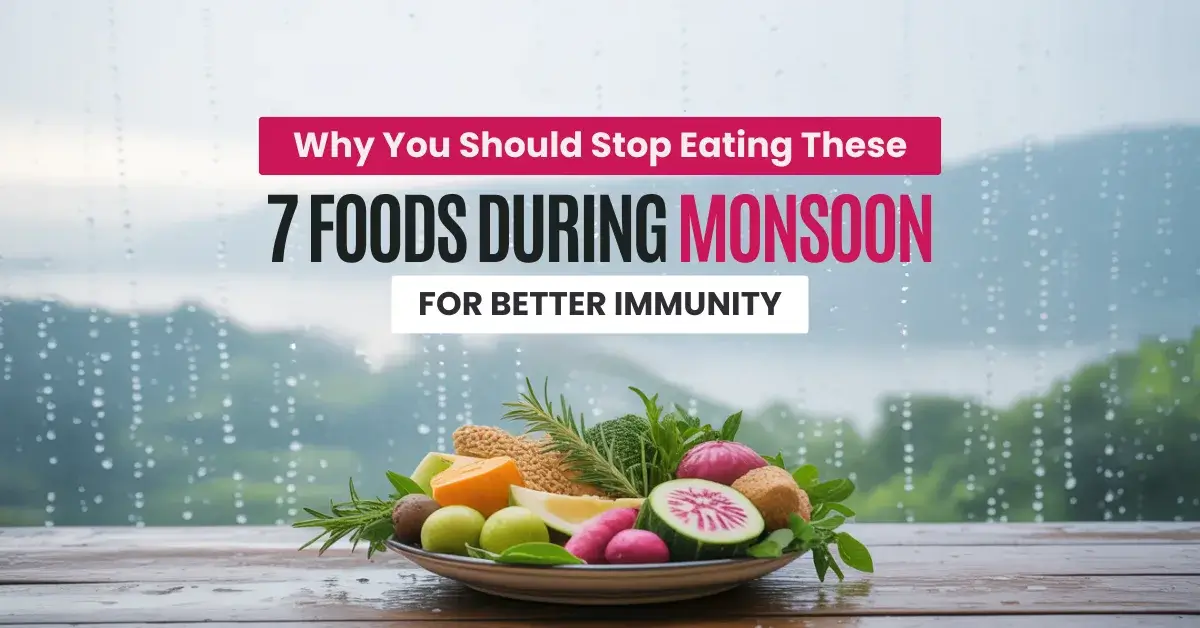The monsoon season in India brings relief from the summer heat but also brings along its own set of health challenges. Increased humidity, sudden temperature fluctuations, and contaminated water make our body more prone to infections, digestive troubles, and weakened immunity.
One of the biggest mistakes people make during the rainy season is eating the wrong foods. Certain foods that may be safe in summer or winter can actually become harmful during the monsoon. If you want to stay healthy and avoid common problems like indigestion, food poisoning, and seasonal flu, it is important to know what not to eat during monsoon.
In this blog, we’ll uncover 7 common foods you should avoid in the rainy season and explain what you can eat instead to keep your immunity strong.
Why Diet Matters More in Monsoon
During monsoon:
- High humidity slows down digestion.
- Stale or contaminated food spoils faster, increasing the risk of food poisoning.
- Mosquito- and water-borne diseases (dengue, malaria, cholera, typhoid) peak during this time.
- Excess fried food adds stress to an already sluggish digestive system.
This is why Ayurveda and modern nutrition both recommend seasonal adjustments in diet. Avoiding certain foods helps reduce the load on your digestive system while supporting immunity.
7 Foods to Avoid During Monsoon
1. Leafy Vegetables (Palak, Methi, Sarson)
While leafy greens are usually healthy, during monsoon they are highly prone to worms, dirt, and bacterial contamination. Waterlogging in fields increases the risk of infections.
- May cause stomach upset, diarrhea, or food poisoning.
- Better alternatives: Lauki (bottle gourd), tinda, parwal, or turai, which are light and easy to digest.
2. Seafood
Monsoon is breeding season for fish and other seafood. Contamination levels are high, making it unsafe.
- Risk of food poisoning and waterborne infections.
- Better alternatives: Opt for freshwater fish post-monsoon or go for dal, paneer, and sprouts as protein-rich options during the season.
3. Street Food & Chaats
Street-side golgappas, samosas, pakoras, and chaats may seem tempting during rains, but they are risky.
- Water used in chutneys and golgappas is often contaminated.
- Fried items increase acidity and indigestion.
- Better alternatives: Make roasted makhana, homemade bhutta (corn), or steamed idlis for a safe monsoon snack.
4. Cut Fruits from Outside
Pre-cut fruits sold by vendors get exposed to flies and unhygienic conditions.
- High chance of contamination leading to stomach infections.
- Better alternatives: Wash and cut fruits at home just before eating. Choose seasonal fruits like jamun, apple, or papaya.
5. Fermented Foods
Fermentation may go wrong during the rainy season due to humidity. Foods like idli, dosa batter, or even curd can spoil faster.
- May cause acidity, bloating, and stomach upset.
- Better alternatives: Freshly prepared home-cooked food, light dals, or khichdi.
6. Fried Snacks (Pakoras, Bhajiyas, Samosas)
Though almost a monsoon ritual in Indian homes, fried snacks should be minimized.
- They slow down digestion and increase acidity.
- Oil often gets reused, leading to unhealthy trans fats.
- Better alternatives: Try baked pakoras, roasted chana, or vegetable soups.
7. Carbonated Drinks
Soft drinks and soda reduce mineral levels in the body and cause dehydration. During monsoon, when immunity is already low, they can make digestion worse.
- Better alternatives: Herbal teas (tulsi, ginger, cinnamon) or warm turmeric milk to boost immunity naturally.
Foods That Boost Immunity in Monsoon
Instead of these risky foods, here are some immunity-boosting alternatives:
- Garlic and Ginger – Natural antimicrobials, improve digestion.
- Haldi (Turmeric) – Reduces inflammation, improves immunity.
- Seasonal Fruits (Jamun, Apple, Pear, Papaya) – High in vitamins and antioxidants.
- Warm Soups and Stews – Easy to digest, keeps the body nourished.
- Probiotic Curd/Yogurt (Freshly prepared) – Boosts gut bacteria if consumed fresh.
- Pulses and Dals – Protein-rich and easy to digest.
Lifestyle Tips to Stay Healthy in Monsoon
- Drink boiled or filtered water only.
- Use ginger, pepper, and cinnamon in cooking to prevent infections.
- Practice portion control to avoid overburdening digestion.
- Include pranayama and yoga to improve immunity and lung function.
- Wash vegetables thoroughly before cooking.
FAQs on Monsoon Diet
Q1: Can I eat curd in monsoon?
Yes, but make sure it is freshly set curd. Avoid sour, stale curd as it can increase throat infections.
Q2: Are mangoes safe in monsoon?
Late-season mangoes may be artificially ripened. Stick to safer fruits like apples, jamun, or papaya.
Q3: Can we drink milk during monsoon?
Yes, warm milk with turmeric or nutmeg can boost immunity and improve digestion.
Q4: Is corn (bhutta) safe in monsoon?
Yes, but ensure it is roasted properly and eaten hot. Avoid adding contaminated chutneys or masalas.
Conclusion
Monsoon is the season of romance, hot teas, and cozy evenings, but it also comes with a higher risk of infections and digestive issues. By avoiding the 7 foods mentioned above — leafy vegetables, seafood, street food, cut fruits, fermented foods, fried snacks, and carbonated drinks — you can significantly reduce the risk of stomach problems and infections.
Instead, focus on warm, freshly cooked, immunity-boosting meals using garlic, ginger, turmeric, and seasonal fruits. With the right food choices, you can enjoy the beauty of the rains without compromising your health.

